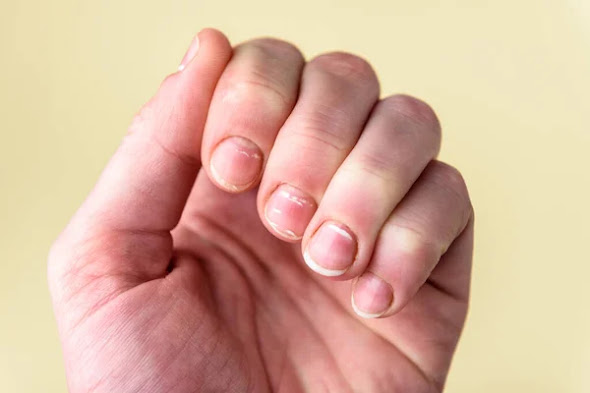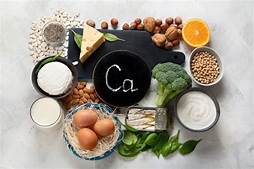Calcium Deficiency-Symptoms And Home Remedies
Note: Friends, if you are comfortable in reading this article in any other language, please change the language from the translate button on the top of this article.
 |
Calcium deficiency, also known as hypocalcemia, is a condition where the body does not have enough calcium in the blood. |
Overview
Calcium deficiency, also known as hypocalcemia, is a condition where the body does not have enough calcium in the blood.
Calcium is a mineral that is essential for many of the body's functions, including building strong bones, transmitting nerve impulses, contracting muscles, and regulating heart rate.
Causes of calcium deficiency
Calcium deficiency can be caused by a variety of factors, including:
Insufficient calcium intake:
A diet that is low in calcium-rich foods, such as dairy products, leafy green vegetables, and fish with bones, can lead to calcium deficiency.
Vitamin D deficiency:
Vitamin D helps the body absorb calcium, so a deficiency of this vitamin can contribute to calcium deficiency.
Deficiency of Magnesium:
Magnesium is also essential to help absorb calcium in the body.
The deficiency of magnesium leads to the deficiency of calcium but magnesium is not stored in the body.
Malabsorption:
Certain medical conditions, such as celiac disease and Crohn's disease, can interfere with the body's ability to absorb calcium from the intestines.
Chronic kidney disease:
The kidneys play an important role in regulating calcium levels in the blood.
Chronic kidney disease can interfere with this process and lead to calcium deficiency.
Medications:
Some medications, such as antacids that contain aluminum and certain diuretics, can interfere with calcium absorption and lead to calcium deficiency.
Surgery or injury:
Surgical procedures that remove or damage the parathyroid glands, which regulate calcium levels in the blood, can cause calcium deficiency.
Additionally, injury to the bones, such as a fracture, can lead to a release of calcium into the bloodstream, which can contribute to calcium deficiency.
Alcoholism and substance abuse:
Alcohol and certain drugs can interfere with calcium metabolism and lead to calcium deficiency.
Excessive Loss:
Excessive loss of calcium through urine or sweat.
Symptoms of calcium deficiency
- Calcium deficiency, also known as hypocalcemia, can cause a wide range of symptoms, including:
- Numbness and tingling in the fingers, toes, and face
- Muscle cramps and spasms
- Joint and muscle pain
- Convenient fatigue or weakness
- Brittle nails
- Dental problems, such as tooth decay and gum disease
- Mood changes, such as anxiety or depression
- Memory loss or confusion
- Seizures
- Abnormal heart rhythms
It's important to note that the symptoms of calcium deficiency can vary from person to person, and in some cases, there may be no symptoms at all.
Early diagnosis and treatment can help prevent the development of more serious complications.
Here are some very good home remedies that can help you in getting rid of calcium deficiency:
Please see the above video for reference.
- The recommended daily requirement of calcium in the body
0 to 12 months 200 to 260 mg/day
1 to 8 years 700 to 1000 mg/day
9 to 18 years 1300 mg/day
19 to 70 years 1000 mg/day
71+ years 1200 mg/day
- Calcium deficiency may result in any of these- yellow teeth, tooth decay, dry skin, infertility, kidney stone, arthritis, weakness, thinning of bones and nails, depression, numbness, tingling in hands and feet, and muscle spasm.
- Consume foods rich in calcium-sesame seeds, milk, spinach, yogurt, cheese, soy products, eggs, fish, and dried apricots.
- Vitamin D is essential to help absorb calcium in the body. Expose to sun for 10 to 15 minutes in the morning.
- Consume foods rich in vitamin D-eggs, butter, margarine, liver, cheese, fatty fish, orange juice, yogurt, and milk.
- Magnesium is also essential to help absorb calcium in the body. Deficiency of magnesium leads to deficiency of calcium but magnesium is not stored in the body.
- Consume foods rich in magnesium-brown rice, broccoli, almonds, cashews, black chocolate, spinach, cucumber, and green beans.
Our Other Must-Read Articles:
Causes of calcium deficiencies in children
Calcium deficiency in children can be caused by several factors, including:
General reasons:
Insufficient calcium intake, Vitamin D deficiency,
Malabsorption, Chronic illness, Medications
Rapid growth:
Children who are growing rapidly, such as during adolescence, may have an increased demand for calcium, and if they do not get enough from their diet, they may develop calcium deficiency.
Excessive physical activity:
Children who participate in high levels of physical activity, such as gymnastics or distance running, may lose more calcium through sweat and urine and be at risk for calcium deficiency.
If you are concerned that your child may have calcium deficiency, it's important to talk to your pediatrician, who can perform tests to diagnose the condition and recommend the appropriate treatment.
Causes of calcium deficiency in women
Calcium deficiency in women can be caused by several factors, including:
General causes:
Insufficient calcium intake, Vitamin D deficiency,
Malabsorption, Chronic illness, Medications.
Menopause:
During menopause, women experience a decline in estrogen levels, which can lead to bone loss and an increased risk of calcium deficiency.
Pregnancy and breastfeeding:
Women who are pregnant or breastfeeding have an increased demand for calcium, and if they do not get enough from their diet, they may develop calcium deficiency.
What are the symptoms of calcium deficiency in kids?
In children, calcium deficiency can cause the following symptoms:
- Delayed growth and development
- Weak bones and increased risk of fractures
- Muscle cramps and spasms
- Tooth problems, such as cavities or gum disease
- Irritability and mood changes
- Poor appetite
- Constipation
- Numbness and tingling in the fingers, toes, and face
It's important to note that these symptoms can be subtle and may not be immediately noticeable.
In some cases, children with calcium deficiency may not experience any symptoms at all.
If you are concerned that your child may have calcium deficiency, it's important to talk to your pediatrician
The appropriate range of calcium intake for elders and children
The appropriate range of calcium intake for elders and children depends on their age, sex, and other factors such as pregnancy or lactation.
Here are the recommended daily allowances (RDAs) for calcium:
For children:
- Infants 0-6 months: 210 mg/day
- Infants 7-12 months: 270 mg/day
- Children 1-3 years: 700 mg/day
- Children 4-8 years: 1,000 mg/day
- Children 9-13 years: 1,300 mg/day
For adults and adolescents:
- Women and men aged 14-18 years: 1,300 mg/day
- Women aged 19-50 years: 1,000 mg/day
- Women aged 51 years and older: 1,200 mg/day
- Men aged 19-70 years: 1,000 mg/day
- Men aged 71 years and older: 1,200 mg/day
It's important to note that these are general recommendations, and the appropriate amount of calcium may vary based on individual needs and other factors.
If you are concerned about your calcium intake, it's important to talk to your doctor, who can recommend an appropriate amount of calcium for your specific needs.
Meals recommended for elders and children to fulfill the daily need for calcium
 |
| Calcium-rich foods that are suitable for elders and children |
Here are some calcium-rich foods that are suitable for elders and children:
For elders:
- Dairy products such as milk, yogurt, and cheese
- Fortified products such as orange juice, soy milk, and cereal
- Dark, leafy greens such as kale, spinach, and collard greens
- Sardines, salmon, and other fatty fish with bones
- Nuts and seeds, such as almonds and sesame seeds
- Tofu
- Dried figs
For children:
- Dairy products such as milk, yogurt, and cheese
- Fortified products such as orange juice, soy milk, and cereal
- Dark, leafy greens such as kale, spinach, and collard greens
- Nuts and seeds, such as almonds and sesame seeds
- Dried figs
- Fortified bread and other baked goods
- Calcium-rich snacks, such as cheese sticks or calcium-fortified crackers
It's important to note that calcium can also be obtained through calcium supplements, but it is always best to try to get calcium from food sources whenever possible.
What happens if calcium deficiency is not fulfilled for a long time?
If calcium deficiency is not addressed and continues over an extended period of time, it can lead to a number of serious health problems, including:
Osteoporosis:
Calcium is essential for maintaining strong bones, and a lack of calcium can lead to osteoporosis, a condition in which bones become fragile and more likely to break.
Hypocalcemia:
Calcium plays a vital role in many of the body's functions, including muscle contraction, blood clotting, and nerve transmission.
If the body doesn't get enough calcium, it can lead to hypocalcemia, a condition characterized by low levels of calcium in the blood.
Tooth decay:
Calcium is essential for maintaining healthy teeth, and a lack of calcium can increase the risk of tooth decay.
Muscle cramps and spasms:
Calcium helps regulate muscle contractions, and a lack of calcium can cause muscle cramps and spasms.
Numbness and tingling in the hands and feet:
A lack of calcium can affect the nervous system, causing numbness and tingling in the hands and feet.
Mood changes:
Calcium is involved in the regulation of mood, and a lack of calcium can lead to mood swings and depression.
Some FAQs with answers on the deficiency of calcium
Q: How can I prevent calcium deficiency?
A: The best way to prevent calcium deficiency is to make sure you're getting enough calcium in your diet.
Calcium-rich foods include dairy products, leafy green vegetables, nuts and seeds, and fortified foods such as orange juice and cereal.
Q: Can calcium supplements cause side effects?
A: Calcium supplements can cause side effects, but these are typically mild and short-lived.
Common side effects of calcium supplements include constipation, bloating, and gas.
In rare cases, taking high doses of calcium supplements can lead to kidney stones or other serious health problems.
Additionally, it's important to drink plenty of water and to include foods that are high in magnesium, which can help reduce the risk of developing kidney stones.
Q: Is it possible to get too much calcium?
A: Yes, it's possible to get too much calcium, which can lead to health problems.
High doses of calcium can cause kidney stones, constipation, and other side effects.
Q: Is calcium deficiency common?
A: Calcium deficiency is a relatively common condition, especially in older adults, postmenopausal women, and individuals who follow a vegetarian or vegan diet.
Q: What are some calcium-rich foods?
A: Calcium-rich foods include dairy products such as milk, cheese, and yogurt, leafy green vegetables such as kale and broccoli, nuts and seeds, and fortified foods such as orange juice and cereal.
Q: Are calcium supplements safe for everyone?
A: Calcium supplements are generally safe for most people, but they may not be appropriate for everyone.
If you have kidney problems, take certain medications, or have a history of kidney stones, talk to your doctor before taking calcium supplements.
Additionally, high doses of calcium can cause side effects, so it's important to take the recommended dose, as directed by your doctor.
Conclusion: To fulfill the need for Calcium in the body, you can not only depend on calcium-rich meals. You have to take meals rich in Vitamin D and Magnesium.
Question: Friends, how do you feed your kids with calcium-rich foods? Share your experience with our readers in the comments.
Friends, Stay Fit, Stay Happy
___________________________________________
Friends, if you liked it, please share it with your friends.
SHARING IS CARING.
Compiled by: Paramjit Singh Rana

Comments
Post a Comment